| Srl | Item |
| 1 |
ID:
116883
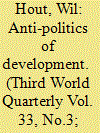

|
|
|
|
|
| Publication |
2012.
|
| Summary/Abstract |
This article discusses the attempt undertaken by several development aid agencies since the turn of the century to integrate political economy assessments into their decision making on development assistance. The article discusses three such attempts: the Drivers of Change adopted by the UK's Department for International Development, the Strategic Governance and Corruption Analysis (sgaca) developed by the Dutch Directorate General for International Cooperation and the new thinking on political economy analysis, policy reform and political risk advanced by the World Bank. On the basis of a political-economic interpretation of development agencies, two main factors are found to hinder the successful application of political economy assessment. In the first place, the agencies' professional outlook leads them to see development in primarily technical terms. In the second place, the nature of incentives for development professionals leads them to resist the implementation of political economy analyses.
|
|
|
|
|
|
|
|
|
|
|
|
|
|
|
|
| 2 |
ID:
095185
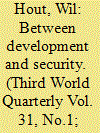

|
|
|
|
|
| Publication |
2010.
|
| Summary/Abstract |
This article focuses on the recent attention in the European Union on fragile states, as expressed, among others, in the European Security Strategy of 2003 and the European Consensus on Development of 2006. Most understandings of the notion of state fragility concern limited state capacity, the inability of institutions to deal with social and political tensions or problems of state legitimacy. The EU is no exception to this general trend of seeing state fragility in terms of governance deficits. Its approach to preventing and responding to state fragility, which was adopted by the European Council in 2007, is being tested in six pilot countries. The article analyses the governance-oriented measures that have been adopted in the Country Strategy Papers (CSPs) agreed between the European Commission and five of the six pilot countries, concluding that there is a profound gap between the political-economic analyses of the CSPs and the support policies implemented by the EU. The approach of the European Commission revolves around attempts to reconstruct state capacities in fragile states through technocratic measures. Fundamental problems of state capture, ethnic relations, human rights violations and extreme inequalities are beyond the purview of policy makers in the European Union.
|
|
|
|
|
|
|
|
|
|
|
|
|
|
|
|
| 3 |
ID:
095173
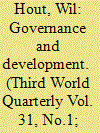

|
|
|
|
|
| Publication |
2010.
|
| Summary/Abstract |
This introductory article to the special issue on European Union, development policies and governance discusses how notions of ('good') governance have come to dominate development discourses and policies since the mid-1990s. The article argues that governance was part of the so-called Post-Washington Consensus, which understands governance reform as part of the creation of market societies. Although academics have commonly emphasised the fact that governance concerns the rules that regulate the public sphere, the dominant understanding of (good) governance in policy circles revolves around technical and managerial connotations. The second part of the article introduces some important features of EU development policy, and argues that this is essentially neoliberal in nature and favours a technocratic approach to governance reform. The EU's main instrument in relations with developing countries is the Country Strategy Paper, which includes a set of governance indicators for the assessment of the political situation in partner countries. In addition, the European Union has developed a 'governance profile', which consists of nine components.
|
|
|
|
|
|
|
|
|
|
|
|
|
|
|
|
| 4 |
ID:
058085
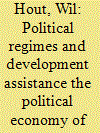

|
|
|
| 5 |
ID:
001605
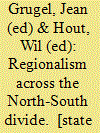

|
|
|
|
|
| Publication |
London, Routledge, 1999.
|
| Description |
xx,198p.
|
| Standard Number |
0415162122
|
|
|
|
|
|
|
|
|
|
|
|
Copies: C:1/I:0,R:0,Q:0
Circulation
| Accession# | Call# | Current Location | Status | Policy | Location |
| 041188 | 337/GRU 041188 | Main | On Shelf | General | |
|
|
|
|